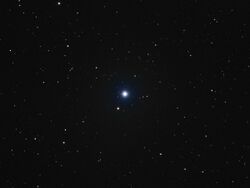Astronomy:21 Lyncis
| Observation data Equinox J2000.0]] (ICRS) | |
|---|---|
| Constellation | Lynx |
| Right ascension | 07h 26m 42.85187s[1] |
| Declination | +49° 12′ 41.4907″[1] |
| Apparent magnitude (V) | 4.61[2] |
| Characteristics | |
| Evolutionary stage | main sequence |
| Spectral type | A0.5Vs[3] |
| B−V color index | −0.001±0.002[2] |
| Astrometry | |
| Radial velocity (Rv) | +26.8±0.1[2] km/s |
| Proper motion (μ) | RA: −10.22[1] mas/yr Dec.: −49.29[1] mas/yr |
| Parallax (π) | 11.92 ± 0.24[1] mas |
| Distance | 274 ± 6 ly (84 ± 2 pc) |
| Absolute magnitude (MV) | −0.01[2] |
| Details | |
| Mass | 2.22[4] M☉ |
| Luminosity | 102.01[2] L☉ |
| Temperature | 9,692±330[4] K |
| Rotational velocity (v sin i) | 18[4] km/s |
| Age | 272[4] Myr |
| Other designations | |
| Database references | |
| SIMBAD | data |
21 Lyncis is a single[6] star in the northern constellation of Lynx. It is visible to the naked eye as a faint, white-hued star with an apparent visual magnitude of 4.61.[2] The star is located at a distance of about 274 light years away from the Sun, based on parallax.[1] It is moving further away from the Earth with a heliocentric radial velocity of around +27 km/s.[2]
This object is an ordinary A-type main-sequence star with a stellar classification of A0.5Vs,[3] where the 's' suffix indicates "sharp" lines in the spectrum, usually due to slow rotation. It is about 272[4] million years old with a projected rotational velocity of 18 km/s.[4] The star has 2.22[4] times the mass of the Sun and is radiating 102[2] times the luminosity of the Sun from its photosphere at an effective temperature of 9,692 K.[4]
References
- ↑ 1.0 1.1 1.2 1.3 1.4 1.5 van Leeuwen, F. (2007), "Validation of the new Hipparcos reduction", Astronomy and Astrophysics 474 (2): 653–664, doi:10.1051/0004-6361:20078357, Bibcode: 2007A&A...474..653V.
- ↑ 2.0 2.1 2.2 2.3 2.4 2.5 2.6 2.7 Anderson, E.; Francis, Ch. (2012), "XHIP: An extended hipparcos compilation", Astronomy Letters 38 (5): 331, doi:10.1134/S1063773712050015, Bibcode: 2012AstL...38..331A.
- ↑ 3.0 3.1 Abt, Helmut A.; Morrell, Nidia I. (1995), "The Relation between Rotational Velocities and Spectral Peculiarities among A-Type Stars", Astrophysical Journal Supplement 99: 135, doi:10.1086/192182, Bibcode: 1995ApJS...99..135A
- ↑ 4.0 4.1 4.2 4.3 4.4 4.5 4.6 4.7 David, Trevor J.; Hillenbrand, Lynne A. (2015), "The Ages of Early-Type Stars: Strömgren Photometric Methods Calibrated, Validated, Tested, and Applied to Hosts and Prospective Hosts of Directly Imaged Exoplanets", The Astrophysical Journal 804 (2): 146, doi:10.1088/0004-637X/804/2/146, Bibcode: 2015ApJ...804..146D.
- ↑ "21 Lyn". SIMBAD. Centre de données astronomiques de Strasbourg. http://simbad.u-strasbg.fr/simbad/sim-basic?Ident=21+Lyn.
- ↑ Eggleton, P. P.; Tokovinin, A. A. (September 2008), "A catalogue of multiplicity among bright stellar systems", Monthly Notices of the Royal Astronomical Society 389 (2): 869–879, doi:10.1111/j.1365-2966.2008.13596.x, Bibcode: 2008MNRAS.389..869E.
 |

